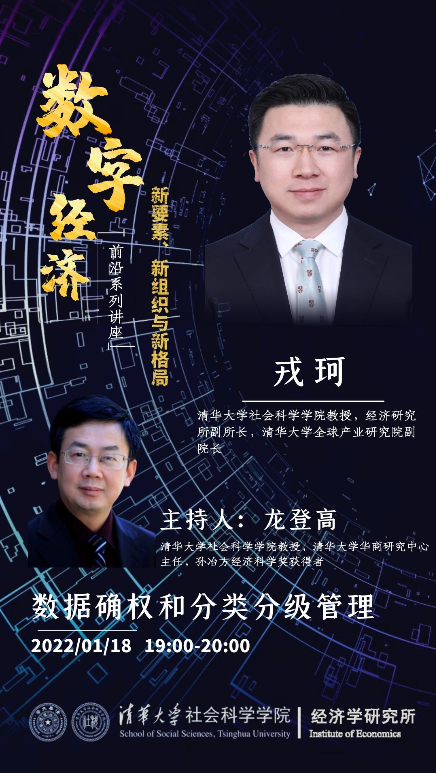
On January 18, Rong Ke, professor at the School of Social Sciences, Tsinghua University and deputy director of the Institute of Economics, Tsinghua University, gave the Lecture 2 of Frontiers of Digital Economy Lecture Series, with the theme of data ownership and hierarchical data classification management. The lecture was presided over by Long Denggao, professor at the Institute of Economics, School of Social Sciences, Tsinghua University and director of the Center for Chinese Entrepreneur Studies, Tsinghua University.
Prof. Long introduced the main content and significance of this lecture, and Prof. Rong’s academic background and research orientations. He said that China has been constantly boosting the development of its market economy, and the marketization of data elements and other production factors has become one of the keys to the development of China’s market economy. The marketization of data elements, like the marketization of land elements, should focus on the three key points of “clear property rights”, “diversified transaction forms”, and “regulatory management of government and markets”.
In the lecture, Prof. Rong first interpreted General Secretary Xi Jinping’ speech “Building Up the Strength, Quality, and Size of China’s Digital Economy” and “Outline of the 14th Five-Year Plan for Digital Economy Development” released by the State Council, and explained in detail the composition and structure of the digital economy system and the trend of digital economy development, and introduced the historical background of studying data elements. He emphasized that data elements are the core of the development of digital economy, and the establishment of a market system for data elements is the key point and difficulty for the development of China’s digital economy in the next few years. The study of data elements and data ownership is of great significance to the development of China’s digital economy.
Subsequently, Prof. Rong introduced the main sources of data generation and the international position and domestic background of data elements. He believed that a large amount of data will come from business (To B) industrial Internet in the future. For the vast amount of data, the United States advocates data liberalism and opposes data localization; Europe and Russia advocate data protectionism and strongly promote data localization; while China’s view on the use of data elements can be summarized as “data utilitarianism”, which requires data localization and supports the free flow of data, taking into account the need for cross-border data flow while ensuring data security. He specifically highlighted that data element is the first production factor in the future digital economy era, and whoever holds the first element of the era will be the pioneer of the era.
Then, Prof. Rong introduced the general background and basic logic of data element market, and put forward five suggestions for data governance: actively cultivating partners (data ecology), scenarios-based ownership (data ownership), and hierarchical classification authorization (data authorization), internal and external hierarchical governance (data market), and clear and standardized data flow (data organization). He proposed that the development and utilization of data elements cannot be limited to the data elements themselves, but also requires the establishment of a sound digital economic ecology. In the future competition and cooperation in the digital economy ecology, China needs to make consumer (TO C) Internet healthier and business (TO B) industrial Internet delivered, which requires independent, controllable, open and compatible digital technology and data elements that can be safely circulated. In addition, he summarized the new pattern, new organization, new elements and new products of digital globalization and indicated that digital infrastructure is the foundation for supporting digital elements, and that China should establish a second ecology that is independent, open and compatible (led by the United States) with the first ecology, to build business ecological trust and strengthen its own economic resilience in the era of digital economy, and create platforms or eco-friendly products.
Prof. Rong concluded the lecture by introducing the new magazine Journal of Digital Economy. This Lecture Series is supported by Sina Finance, NetEase Finance, Chinese Headlines and KeAi’s Journal of Digital Economy. This lecture was well received, attracting 581,000 total viewers on the three online platforms.